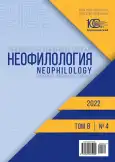Russian cultural realities in the translation of literary works into English
- Authors: Yusupova Y.R.1, Asaturova D.O.2
-
Affiliations:
- Akmulla Bashkir State Pedagogical University
- Ufa State Petroleum Technological University
- Issue: Vol 8, No 4 (2022)
- Pages: 751-758
- Section: LANGUAGES OF PEOPLES OF FOREIGN COUNTRIES (GERMANIC LANGUAGES)
- URL: https://journal-vniispk.ru/2587-6953/article/view/301684
- DOI: https://doi.org/10.20310/2587-6953-2022-8-4-751-758
- ID: 301684
Cite item
Full Text
Abstract
The subject of the study was the ways of transferring cultural and everyday realities from Russian into English when translating works of art. The relevance of the study is determined by the insufficient number of studies within the framework of this language pair as applied to the translation of a literary text and the need to study the dynamics in the approach to solving the translation task. In the course of the study, from two Russian-language works saturated with Russian cultural and everyday realities, examples were selected using the method of continuous sampling, further distributed by thematic groups within the framework of existing classifications. At the stage of comparing the selected units and their translation at the beginning of the 20th and 21st centuries, the ways of their translation into English were determined. A comparative analysis of the ways of translating realities showed that translators of Russian literary texts convey Russian cultural and everyday realities using the methods recommended for translating non-equivalent vocabulary. However, over the past century there has been a change in their hierarchy - the frequency of one or another method for translating realities both in general and within individual thematic groups. Thus, the leading positions are currently occupied by descriptive translation, a combined method of translation, approximate translation, generalization and tracing. Transcription and omission became less common. The smallest dynamics is observed when choosing the method of transferring the realities denoting food and drinks, measures and monetary units, and household items, while when translating the realities of other thematic groups in the 21st century, there was a change in the approach to transferring these units.
About the authors
Yu. R. Yusupova
Akmulla Bashkir State Pedagogical University
Email: yulia.r.yusupova@yandex.ru
ORCID iD: 0000-0001-9103-0413
Candidte of Philology, Associate Professor of Intercultural Communication and Translation Department
3-а Oktyabrskoy revolutsii St., Ufa 450008, Republic of Bashkortostan, Russian FederationD. O. Asaturova
Ufa State Petroleum Technological University
Author for correspondence.
Email: asaturovadarya@mail.ru
ORCID iD: 0000-0003-1017-8083
Bachelor of Linguistics, Master’s Degree in Advertising and Public Relations
1 Kosmonavtov St., Ufa 450062, Republic of Bashkortostan, Russian FederationReferences
- Tomakhin G.D. Realii v yazyke i kul’ture. Realiya-predmet i realiya-slovo [Realities in language and culture. Realia-object and reality-word]. Inostrannyye yazyki v shkole – Foreign Languages At School, 2007, no. 8, pp. 19a-28a. https://www.elibrary.ru/jxtmxd. (In Russian).
- Triberio T. Insights into translation of Russian realia. Translation Studies: Teory and Practice, 2021, no. 2. https://doi.org/10.46991/TSTP/2021.1.2.055
- Khukhuni G.T. Bytovyye realii v sakral’nom tekste: problemy mezh”yazykovoy peredachi [Cultural words de-noting realities of everyday life in sacral texts: the problem of interlingual translation]. Vestnik Mo-skovskogo gosudarstvennogo lingvisticheskogo universiteta. Gumanitarnyye nauki – Vestnik of Moscow State Linguistic University. Humanities, 2018, no. 14 (809), pp. 257-267. https://www.elibrary.ru/nbjqyy. (In Russian).
- Selitrina T., Yusupova Y. A Russian Gentleman by S.T. Aksakov: Reception and Translation. European Pro-ceedings of Socialand Behavioural Sciences, 2019, pp. 846-853. https://www.elibrary.ru/cpjdnj
- Barkhudarov L.S. Yazyk i perevod [Language and Translation]. Moscow, International Relationships Publ., 1975, 239 p. (In Russian).
- Vlakhov S.I., Florin S.P. Neperevodimoye v perevode [Untranslatable in Translation]. Moscow, R. Valent Publ., 2012, 406 p. (In Russian).
- Vinogradov V.S. Vvedeniye v perevodovedeniye (obshchiye i leksicheskiye voprosy) [Introduction to Trans-lation Studies (General and Lexical Issues)]. Moscow, Institute of General Secondary Education of the Russian Academy of Education Publ., 2001, 224 p. (In Russian).
Supplementary files









